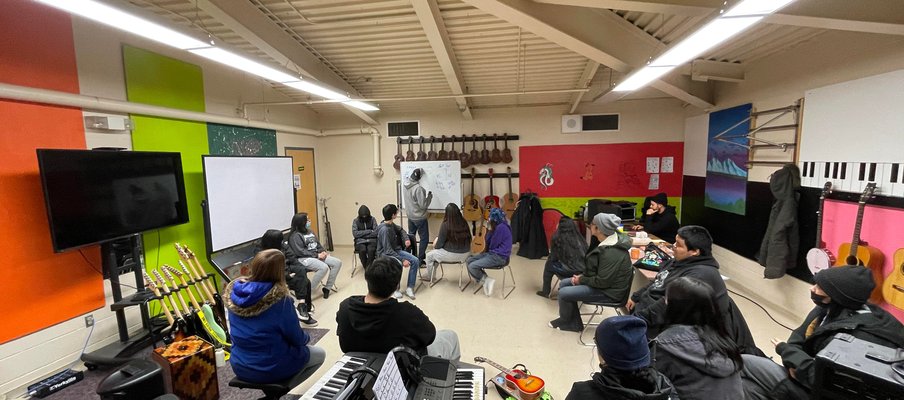
Hip Hop Workshop Develops Voice of Northern Youth
In this issue
 Engage - Volume 14, Issue 2, Spring 2024
Engage - Volume 14, Issue 2, Spring 2024
Cultural Areas
ArtsSaskatchewan’s music scene has always been lively and vibrant, but one organization decided to uplift the hip hop genre in Stanley Mission. Community Arts Mentorship Program (CAMP) SK Arts has received such positive feedback from their hip hop workshops that they wrapped up their third successful year of hosting, with big plans to continue and expand in the future.
Stanley Mission, a community that has welcomed pilot music mentorship programs in the past from CAMP’s founder Eliza Doyle, has been crucial to the success of the program’s growth. “The community provides a lot of support, access to instruments and highly functioning music rooms, recording studio sessions and access to the local radio station,” Doyle explains.
Zoe Slusar, who goes by ZHE the Free in the hip hop scene, returned to Stanley Mission to help deliver the workshop for the second year in a row. Along with building trust with a facilitator, Slusar says the youth are also building connection and community with one another. “The sessions build community because the youth support each other in sharing their voices individually and as a group,” she says. And, because there are many other elements in the genre – such as the DJ, the emcee/rapper, graffiti artists and dancers – there is a lot of opportunity to build connections with others while finding what area feels best for the youth.
Equally as important, both Doyle and Slusar agree that, artistic expression can have a positive influence on those who may be suffering with grief, anxiety, loss, or any other mental health issues. “Hip hop is an amazing tool for creative release,” Slusar explains. “It’s a very accessible art form that costs nothing and helps young people speak their truth. Whatever young people may be experiencing, they can write about it and find healing through the music.”
The program casts a wide net of youth from grades 3 to 12, and it requires no previous experience to participate. Workshop sessions are accommodated for the varying age groups over the course of the week, and the program ends with a recorded song at the local radio station.
Doyle says, “Musical expression allows youth the opportunity to develop their own voice. There is confidence that comes from finding your own voice, and it’s really important for setting them up for success in the world.”
Perhaps most important to the success of the program is the community trust Doyle and musicians have built within the community. “An Elder shared with me that it is really important to bring back the same musicians and build off the programming for consistency,” she says. “There are a lot of service workers and practitioners who come and go from the community, and trust can be a really hard barrier with youth.”
Further, the organization steers away from ‘one-off’ sessions in communities, and instead opts for permanent music positions in residencies in northern communities, with multiple musicians who rotate residencies on a consistent basis. “Bringing the same people back over the course of a year or more builds relationships in a good way.”
For the future, CAMP hopes to expand into other northern communities with more frequent workshops in communities with existing relationships. Most importantly, CAMP remains committed to bringing the arts to northern communities and building confidence in young people.
CAMP Sask Arts has received project support from SaskCulture’s Multicultural Initiative Fund, Northern Youth Cultural Fund and the Small Grant Accessibility Program, all funded by Sask Lotteries Trust Fund for Sport, Culture and Recreation, delivered in partnership with SaskCulture.

